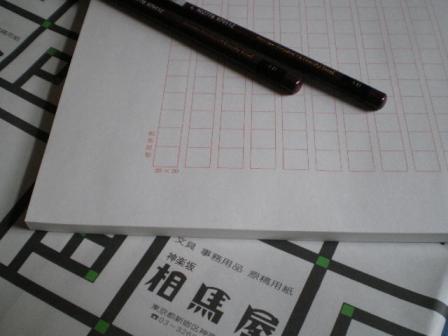
 |
|
|
||||
|
04-01-2010, 03:15 PM
Quote:
 |
|
|||
|
04-02-2010, 02:37 PM
Quote:
Quote:
btw, if someone is holding on to me and i shout はなしてくれ, would that be 離してくれ or 放してくれ? also, is it true that 単語 is an abstract entity of a word and 字 is a physical entity of a word? E.g. if i want to look up a word in a dictionary it is 辞書で単語を調べる, but if i were to say the dictionary has 500 words it will be 辞書に字が500ある? |
|
||||
|
04-02-2010, 02:59 PM
Quote:
Quote:
辞書に字が500ある sounds very wrong. That would be 単語. |
|
|||
|
04-03-2010, 04:05 PM
oic, anyway i was wondering how will the "word-length" of a japanese essay be counted? (like in english, if i were to say a 1500 word essay, its very easy to count each word individually and add up the total)
also, when we send a (written) invitation to someone, what’s the difference in nuance between 招待状を送る and 招待状を発送する, or is there no difference? and when we receive the invitation, which would be appropriate: 招待状を受け取る or 招待状をもらう? |
|
||||
|
04-03-2010, 04:35 PM
Quote:
And 発送する is more formal than 送る. The first is an example of 漢語 or something (I think that's the term for this). Whatever this class of verb is called, it's almost always KANJI+KANJI+する, and it's more formal than the "native Japanese" verb. It's exactly like the relationship between Latin and Germanic words in English. "poop" vs "feces" "chew" vs "masticate" "blow up" vs "inflate" etc. |
|
||||
|
04-03-2010, 04:51 PM
Quote:
 Quote:
発送する sounds colder and more business-like than 送る. 受け取る simply means "I'm in receipt of ~~." It can (but not always) sound cold. もらう has a connotation that "you are happy" to receive ~~. |
|
|||
|
04-05-2010, 02:27 AM
cool, does it mean that when talking to friends we will hardly use the kanji + kanji +する type of verbs?
also, i was wondering is it true that workers in government industries like schools, post offices, theme parks, hospitals, transport services like bus, train, taxis etc, will be called 職員. and workers of private companies will be called 社員? |
|
||||
|
04-05-2010, 02:36 AM
Quote:
Quote:
FYI, in Japan, the Post Office is no longer operated by the government. Very few theme parks are, too. |
|
|||
|
04-06-2010, 01:18 AM
Quote:
Also, is 毎年 more commonly read as まいとし or まいねん? And if we have 毎年毎年 to mean “year after year”, will it be read as まいとしまいとし or まいねんまいねん. Similarly, what’s the preferred pronounciation for 毎月 (まいげつ / まいつき) and 毎月毎月. |
 |
| Thread Tools | |
|
|